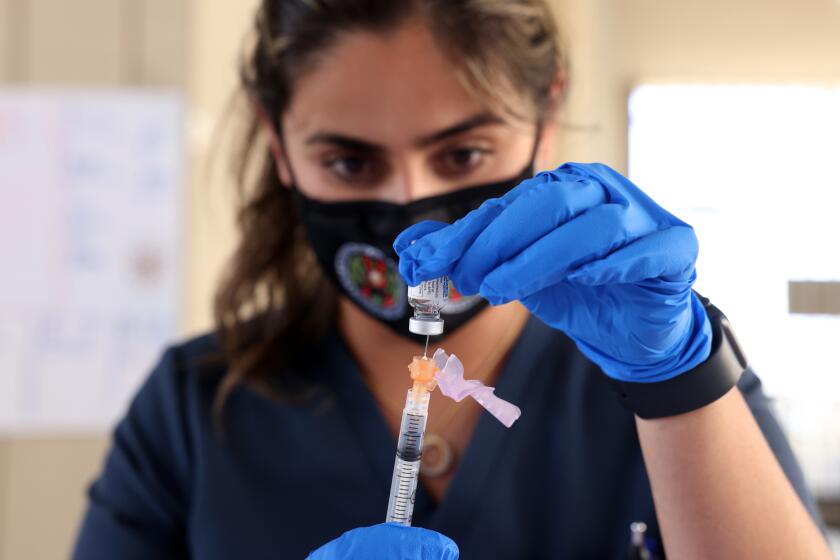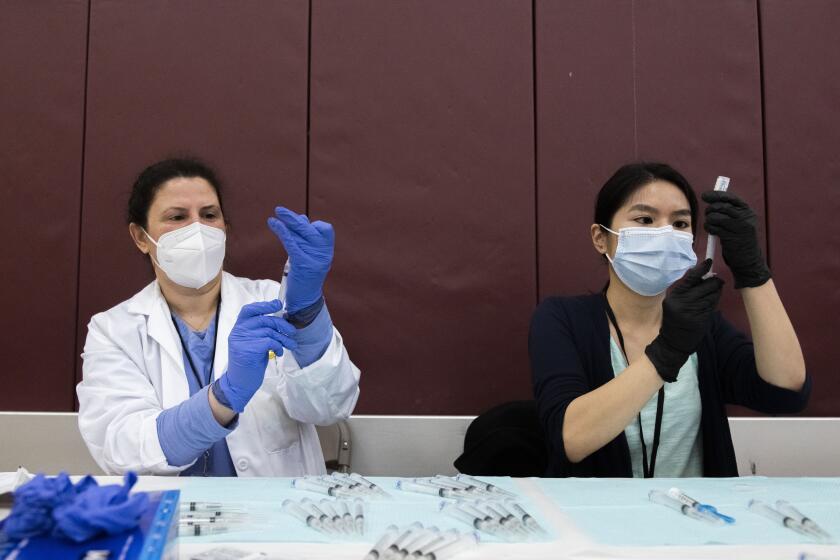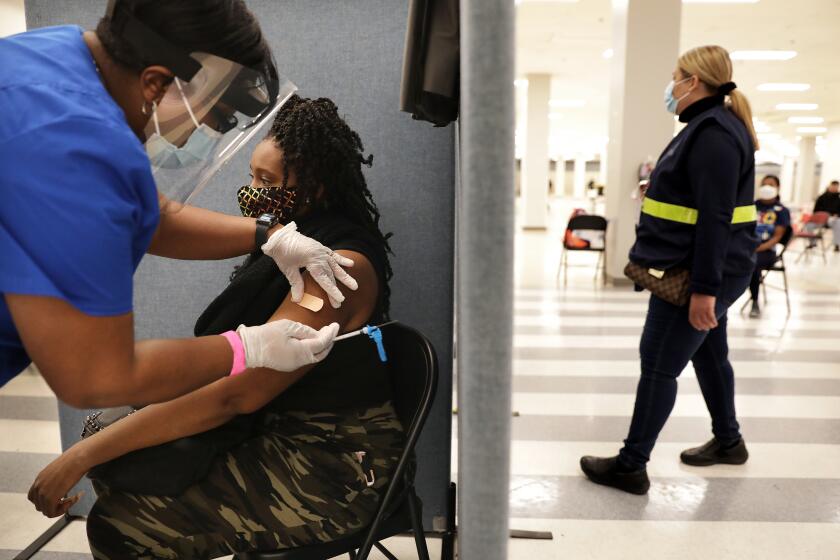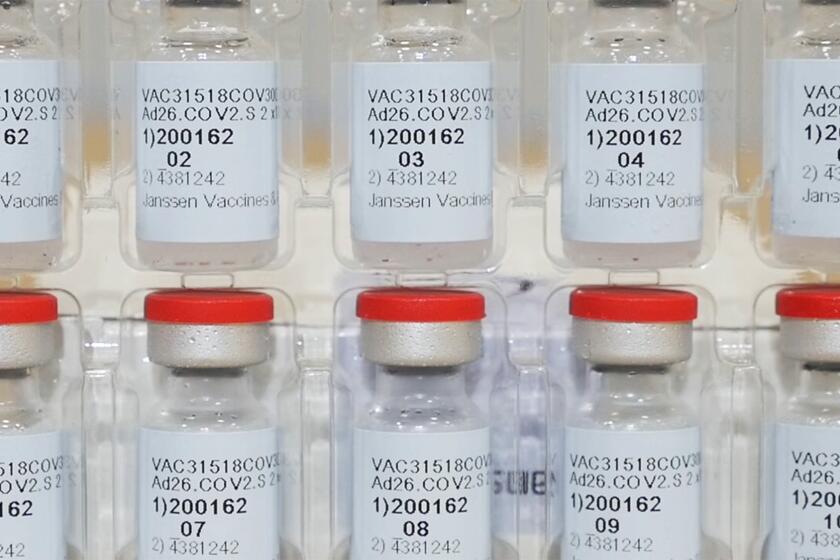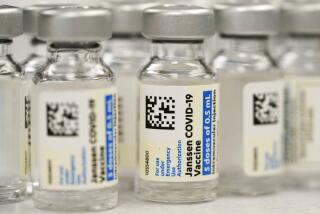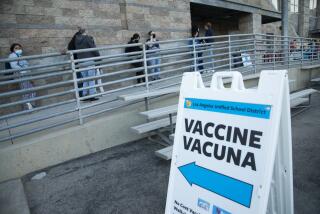Will Johnson & Johnson woes make it harder to get COVID-19 vaccine in California?
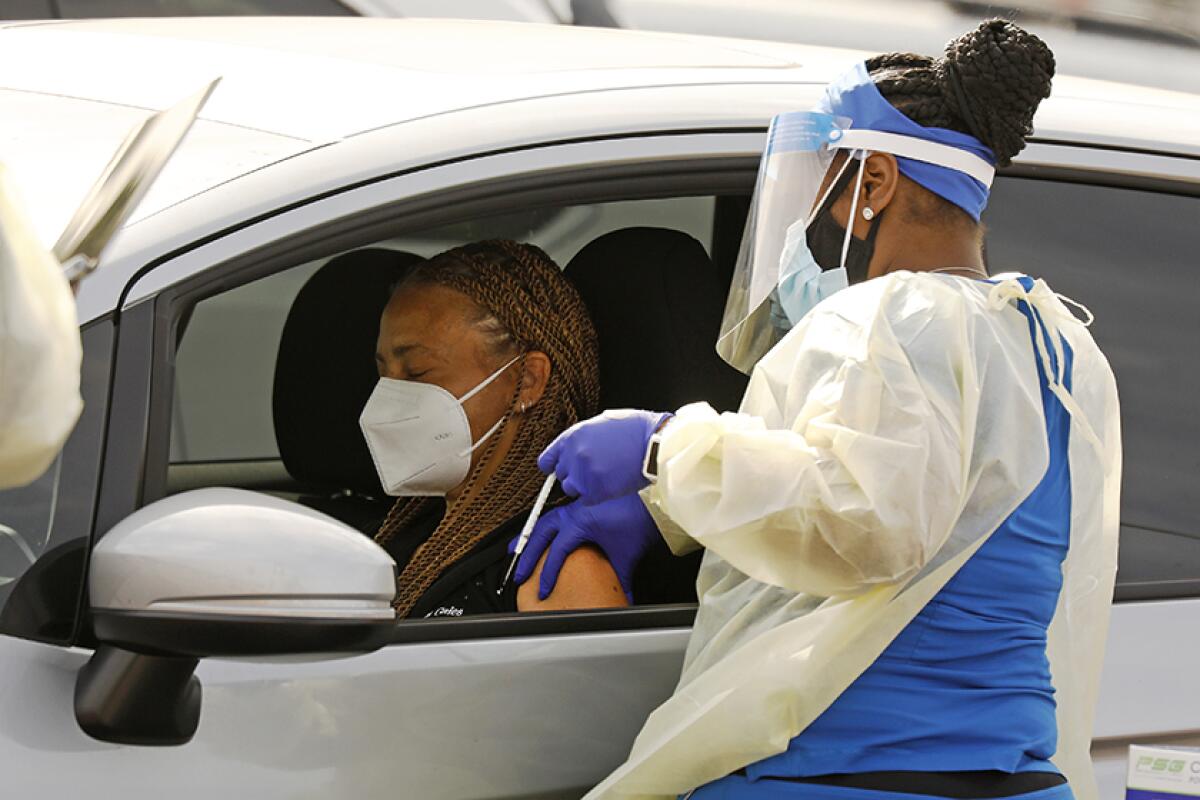
- Share via
At first glance, the timing couldn’t be worse: thousands of COVID-19 vaccines going on ice at the same time California is preparing to make them available for everyone 16 and older.
But how difficult will Tuesday’s decision to pause use of the Johnson & Johnson vaccine — made on the recommendation of federal health officials following reports of six cases of serious blood clots nationwide — actually make it to get a shot in California?
While officials say the impact here will be limited, at least at first, and they’re confident other supply streams will help the state maintain its inoculation pace, any prolonged interruptions would threaten to slow if not stymie those efforts.
That’s especially the case in a state where demand for the COVID-19 vaccine has far outstripped supply, and where millions more people will be newly eligible to roll up their sleeves Thursday.
California will temporarily stop administering the Johnson & Johnson COVID-19 vaccine after reports of six serious blood clots nationwide.
Here is what we know:
Why is California optimistic?
Officials have expressed confidence that the pause won’t throw a significant wrench in the state’s race to widely vaccinate as many people as possible. Less than 4% of California’s allocation from the federal government this week — 67,600 out of roughly 2 million doses — is from Johnson & Johnson.
“As the federal government has said, we do not expect a significant impact to our vaccination allocations,” state epidemiologist Dr. Erica Pan said in a statement.
Officials said the pause in J&J vaccines will not change California’s plan to expand vaccine eligibility this week, nor is it expected to throw off the timeline of fully reopening the economy two months from now.
“It will not materially impact our ability to fulfill our expectations and commitment to ... fully vaccinate all those that seek to get vaccinated so that we can begin to more fully open our economy by June 15,” Gov. Gavin Newsom said Tuesday.
Two COVID-19 vaccines have now been linked to a risk of developing blood clots. Scientists don’t know whether the vaccines are to blame.
How much J&J vaccine has been administered?
Roughly 902,000 Johnson & Johnson doses have been administered in California, according to data from the Centers for Disease Control and Prevention.
Of the 192 million total COVID-19 vaccine doses that have been doled out nationwide, just 7.2 million have been Johnson & Johnson.
The bulk have been the Pfizer-BioNTech and Moderna vaccines, both of which are being distributed and administered as normal. Unlike the single-shot Johnson & Johnson vaccine, they each require two doses, administered weeks apart.
Newsom, who himself received the Johnson & Johnson vaccine April 1, said roughly 8,800 appointments scheduled for that vaccine through the state’s My Turn platform will need to be converted to Moderna and Pfizer alternatives.
What about in L.A.?
Officials in the city and county of Los Angeles said they don’t believe the Johnson & Johnson stoppage should have a major effect in the near term.
“Out of the 323,470 total doses allocated to the county this week, only 19,600 were Johnson & Johnson doses,” the Department of Public Health wrote in an email to The Times. “Vaccine providers in Los Angeles County will contact patients that were scheduled to receive the Johnson & Johnson vaccine about rescheduling or providing a new appointment for Pfizer or Moderna.”
In the city of Los Angeles, the pause will not affect permanent vaccination sites, but will alter plans to provide about 3,000 scheduled doses through the city’s mobile MOVE clinics, officials said Tuesday.
“All appointments at our permanent sites will happen as planned, and the city’s MOVE clinics will honor the appointments for anyone scheduled to receive the Johnson & Johnson vaccine with a first dose of Pfizer as we await further information from health officials,” Mayor Eric Garcetti’s office said in a statement.
Reports of blood clots among those who got Johnson & Johnson’s COVID-19 vaccine may make some recipients anxious. Here’s how to handle those feelings.
What are the concerns with the J&J vaccine?
The presentation of the blood clots reported among the six cases nationally is particularly rare.
Not only is the specific type — known as cerebral venous sinus thrombosis (CVST) — itself uncommon, but the clots are also seen in combination with low levels of blood platelets, known as thrombocytopenia.
The Johnson & Johnson vaccine uses the same method of producing an immune response in a person as the AstraZeneca vaccine, which is also being scrutinized for a possible association with very rare blood clots. The Pfizer and Moderna vaccines use a different approach.
Dr. Peter Marks, director of the Food and Drug Administration’s Center for Biologics Evaluation and Research, said one possible speculative reason behind the rare clots might be related to the vaccine producing an immune response that leads to blood platelets being activated.
Marks said what’s notable about the six identified cases is not just the CVST nor the thrombocytopenia — it’s that they are occurring together.
“It’s their occurrence together that makes a pattern. And that pattern is very, very similar to what was seen in Europe with another vaccine,” Marks said, referring to AstraZeneca. “So I think we have to take the time to make sure we understand this complication, and we address it properly.”
Federal officials said hospitals need to be alert about this rare type of complication. A more common blood clot would normally be treated by a blood-thinning drug called heparin, but using heparin to treat the rare blood clot disclosed Tuesday might be dangerous. Alternative treatments would need to be given, preferably by a doctor experienced in treating blood clots.
“If one administers the standard treatments that we, as doctors, have learned to give for blood clots, one can actually cause tremendous harm or the outcome can be fatal,” Marks said. “So one needs to make sure that providers are aware that if they see people who have low blood platelets, or if they see people who have blood clots, they need to inquire about a history of recent vaccination and then act accordingly in the diagnosis and management of those individuals.”
The six people who developed the rare blood clots were women aged 18 to 48, and showed symptoms of the blood clot between six and 13 days after receiving the Johnson & Johnson vaccine.
“People who received the vaccine in the last three weeks should look for any symptoms of these unusual clots, including severe headaches, abdominal or leg pain, and shortness of breath, and contact their medical provider if symptoms develop,” L.A. County officials said in a statement. “People who don’t have a medical provider can call 211 to connect with a healthcare provider.”
California will temporarily stop administering the Johnson & Johnson vaccine — a move urged by federal officials following reports of six serious blood clots nationwide.
What happens next?
The CDC has scheduled an emergency meeting for Wednesday to discuss the Johnson & Johnson vaccine.
“Until that process is complete, we are recommending a pause in the use of this vaccine out of an abundance of caution,” said a joint statement from Marks and Dr. Anne Schuchat, principal deputy director of the CDC. “This is important, in part, to ensure that the healthcare provider community is aware of the potential for these adverse events and can plan for proper recognition and management due to the unique treatment required with this type of blood clot.”
Dr. Jeff Goad, professor and chair of the department of pharmacy practice at Chapman University, said an FDA panel would examine medical data to determine whether the small number of adverse reactions seem to be connected to the vaccine or are coincidental.
What people need to do, he said, “is wait and let the science guide and see what comes out of the discussions.”
More to Read
Sign up for Essential California
The most important California stories and recommendations in your inbox every morning.
You may occasionally receive promotional content from the Los Angeles Times.
